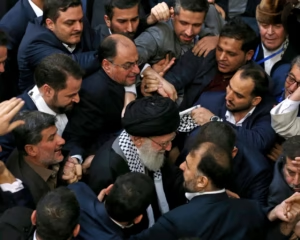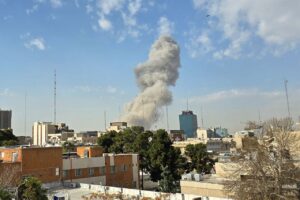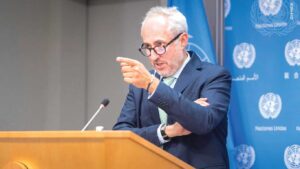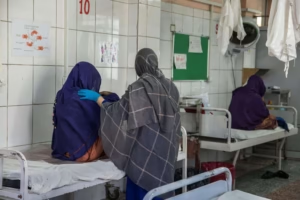KABUL (SW) – Findings by Salam Watandar indicate during the past five years, in 15 predominantly Pashtun provinces, the governors have always been from the same community.
Meanwhile, in the provinces with predominantly ethnic Tajik, Uzbek and Hazara communities during the same period, the governors have often been of diverse background. The findings indicate President Mohammad Ashraf Ghani has in past five years also appointed a total of five Pashto-speaking governors in these provinces during his tenure.
We tried to have the view of the Independent Directorate of Local Governance in this regard; but to no avail.
This is in the wake of ongoing protests against the appointment of Mohammad Dawood, an ethnic Pashtun, as governor for Faryab province predominantly inhabited by ethnic Uzbek people.
Residents of the provinces have always complained against appointment of governors who have no knowledge of the area.
For the past five years, Helmand, Paktia, Paktika, Khost, Logar, Zabul, Uruzgan, Kandahar, Nuristan, Laghman, Kunar, Nangarhar, Ghazni and Kunduz have always had Pashtun governors.
Hayatullah Hayat, who is currently the head of the Ministry of Interior, was introduced as the governor of Helmand in 2016. After Hayat, General Mohammad Yasin was introduced as the governor of this province in 2018 and General Nabi Elham in late 2020. .
Meanwhile, for Paktia province, Nusratullah Arsala, Shamim Khan Katawazi, who is currently the head of the IDLG, and Mohammad Halim Fadai were nominated to run the province, all of whom are ethnically compatible with Paktia residents.
In Paktika, Aminaullah Sharq, Elias Wahdat and Mujibah al-Rahman Samakani were nominated to run the province during the rule of Mohammad Ashraf Ghani.
In Khost, during the last five years, Hakim Khan Habibi, Mohammad Halim Fadai and General Mohmand Katawazi were in charge of overseeing the affairs of the province.
Five governors, one Pashtun and one Tajik, have been nominated for Logar province. Mohammad Halim Fadai in 2015, Niaz Mohammad Amiri in 2017 Mohammad Anwar Ishaqozi in 2019, Mohammad Jamal Shapoor in 2020 and now Abdul Qayyum Rahimi has been in charge of the administration of Logar province.
- Junbish party supporters shut down Faryab governor’s office
- Faryab’s nomads left clueless about Covid-19
In Ghazni, Abdul Karim Matin, Wahidullah Kalimzai and Sayed Omar Nuristani, all Pashtuns, have been named governors in the past five years. In Zabul province, the governors nominated in the last five years have also been Pashtuns namely Khayal Mohammad Hosseini, Rahmatullah Yarmal, Mohammad Nabi Ahmadzai and Ahmad Gul Rasouli.
Haji Assadollah and Mohammad Omar Shirzad are among the figures who have served as governors in Uruzgan for the past five years.
Homayoun Azizi in 2016, General Zalmai Visa in 2017, Hayatullah Hayat in 2019 and Ruhollah Khanzada have been in charge of Kandahar province since 2020.
In 2016, Hafez Abdul Qayyum was introduced as the governor of Nuristan for the first time, then in 2020, Abdul Ghafoor Malekzai, and in 2021, for the second time, Hafez Abdul Qayyum became the governor of Nuristan.
Abdul Laghbar Naimi, Asif Nang and Rahmatullah Yarmal, all of whom are ethnic Pashtuns, have been nominated as governors for Laghman since 2016.
Three governors have been nominated for Kunar province during this period namely Wahidullah Kalimzi in 2016, Abdolsattar Mizkwal in 2017 and Mohammad Eqbal Saeed in 2020.
Gulab Mangal in 2016, Hayatullah Hayat in 2017, Shah Mahmoud Miakhil in 2020 and Zia-ul-Haq Amarkhail in 2021, who all belong to same ethnicity, have been introduced as the governor of Nangarhar.
In the last five years, governors of the same ethnic group have been nominated for Kunduz province namely Asadullah Omarkhel, Abdul Jabbar Naimi and Abdul Sattar Mirzakwal.
For Baghlan, six governors were introduced during the presidency of Mohammad Ashraf Ghani, of whom only one was Tajik and the rest were all from the same ethnic group. Abdul Hai Nemati, Abdul Qadim Niazi, Farid Ahmad Basim, Taj Mohammad Jahed, Zabihullah Hasas and Akbar Barakzai are among those who have governed Baghlan.
However, contrary to that, for other provinces such as Herat, Badghis, Nimroz, Faryab and Takhar, governors from diverse ethnic background than the native community have been appointed.
Herat province has had three governors in the last five years, one Pashtun and two Tajiks. Among them, Mohammad Asif Rahimi was the governor of the province for about four years, Abdul Qayyum Rahimi for about a year before Waheed Qatali took charge.
Next to Herat, Badghis is another provinces for which President Ghani has nominated Pashtun and Tajik governors namely Abdul Ghafoor Malekzai and Hussamuddin Shams.
- Designated Faryab governor takes charge at military facility
- Taliban attacks leave 11 security forces killed Badakhshan, Herat, and Faryab
Nimroz has been both Pashtun and Tajiki governors in the last five years namely Engineer Sami, Sayed Wali Sultan and Zamrialay Ahadi.
One ethnic Uzbek governor, one Hazara governor, one Tajik governor and one Pashtun governor have been nominated for Takhar province in past five years namely Gen. Yasin Zia, Fazlullah Mujaddedi, Abdul Haq Shafaq Hazara, Mawlawi Abdullah Qarluq.
Meanwhile, Balkh, Badakhshan, Farah, Ghor, Panjshir and Parwan are among the provinces that have had no Pashtun governors during this period.
The position of Balkh governor was handed over to Ishaq Rahgozar after the resignation of Atta Mohammad Noor in 2017, and after Rahgozar, this position remains under Farhad Azimi.
Badakhshan has been governed by two Tajik and one Uzbek governors for the past five years namely Shah Waliullah Adib, Ahmad Faisal Begzad and Mohammad Zakaria Soda.
Ghor has also been ruled by ethnic Tajik governors for the past five years namely Ghulam Nasser Khazeh, Noor Mohammad Kohnavard and Abdul Zahir Faiz Zada.
Farah province has also had ethnic Tajik governors for the past five years namely Abdul Basir Salangi, Shoaib Sabet and Taj Mohammad Jahed.
In Parwan province, Mohammad Asim Asim and Fazluddin Ayar have been governors, both from the ethnic Tajik background.
Panjshir has had only one governor in the last five years, Kamaluddin Nezami, who has been from the ethnic Tajik background.
In Jawzjan and Sar-e-Pul provinces, the appointed governors remained from ethnic Uzbek background while Bamyan, Daikundi, Samangan, Maidan Wardak and Kapisa provinces has had governors from ethnic Pashtun, Tajik as well as Hazara backgrounds.
Maulvi Lutfullah Aziz and Gen. Mohammad Hashim, who has recently been named as governors of Jawzjan have led the province for the past five years.
In Sar-e-Pul province, figures from ethnic Uzbek, Turkmen and Hazara community have been appointed as governors namely Mohammad Zahir Wahdat, Abdul Qadir Ashna, Mohammad Noor Rahmani and most recently Qurban Murad Murad.
Bamyan and Daikundi provinces have been governed by ethnic Hazara community members for the past five years and no official from other ethnic groups have been appointed to govern it.
Mohammad Baligh, Sayed Anwar Rahmati, Ahmad Zia Hamdard and Rashida Shahidi, who have just been named Daikundi governors, have led the province for the past five years.
Bamyan had only two governors in the last five years namely Tahir Zuhair and Sayed Ala Rahmati was named governor.
Abdul Rahman Tariq, Muzaffaruddin Yamin, Dr. Shah Jahan, Zandi Gul Zamani, Hayatullah Hayat and Abdul Majid Khogyani are among those who have governed Maidan Wardak.
For the past five years, Mohammad Karim Khatdan, Abdul Latif Ebrahimi and Mohammad Davood Kalkani have been governors of Samangan. Karim Khatdan is from the ethnic Turkmen background, Abdul Latif Ibrahimi is from the ethnic Uzbek background while Mohammad Davud Kalkani is from ethnic Tajik background.
Kapisa has been run by an ethnic Uzbek and an ethnic Pashaey official in past five years namely Sayed Khalid Hashemi and Abdul Latif Murad.
The data obtained by Salam Watandar is based on statistics shared by the IDLG and local journalists across Afghanistan.
ENDS








